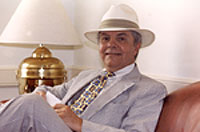 J. Frederick Waring was born in Savannah in 1902, the third of three sons of a real estate broker. He attended "a couple of appalling little private schools" before being sent north to attend Governor Dummer Academy in Massachusetts. He followed other family members to Yale, majored in English, graduated in 1923, then attended Cambridge for advanced study. He remained in England to teach for a year at a "public" school, then returned home in 1926 to teach at the Salisbury School. Later, Waring earned a master's in history at the University of Wisconsin, then taught at a girls school in New Hope, Penn., until 1935 when he joined the WRA faculty.
J. Frederick Waring was born in Savannah in 1902, the third of three sons of a real estate broker. He attended "a couple of appalling little private schools" before being sent north to attend Governor Dummer Academy in Massachusetts. He followed other family members to Yale, majored in English, graduated in 1923, then attended Cambridge for advanced study. He remained in England to teach for a year at a "public" school, then returned home in 1926 to teach at the Salisbury School. Later, Waring earned a master's in history at the University of Wisconsin, then taught at a girls school in New Hope, Penn., until 1935 when he joined the WRA faculty.For more than 30 years, Mr. Waring was a demanding and inspiring teacher of both English and history. His humor was whimsical and erudite - often baffling for younger students. He was a stickler for accuracy and pushed critical thinking. Headmaster John W. Hallowell cited him for his "enthusiasm, his own love of what is good, his standards of taste and excellence." On campus J. Fred Waring was known for his "literary drawl," his pipes and his tweeds, and his extraordinary insight and desire to help students in need.
During World War II he served for a couple years with the American Field Service as an ambulance driver in North Africa and Syria and later taught for a year at the American University in Beirut. In 1953 he married WRA librarian, Julianna Fitch, who shared his love for books, art, history, and historic architecture.
In his later years Waring worked to organize materials related to the school's history and wrote two volumes: James W. Ellsworth and the Refounding of WRA (1961), and The Growing Years: WRA under Wood, Boothby, and Hayden (1972). He and Julianna retired to Savannah in 1967 where they lived in his ancestral home and were active in civic life. He was serving as president of the Georgia Historical Society at the time of his death in 1972. The Waring Prize was established that same year in his honor.
A few years ago I had a chance to visit Waring's grave at the historic Bonaventure Cemetery in Savannah. His headstone reads, "His love of the past was equaled by his concern for the present and his faith in the future." Julianna Fitch Waring passed away in 1986.
